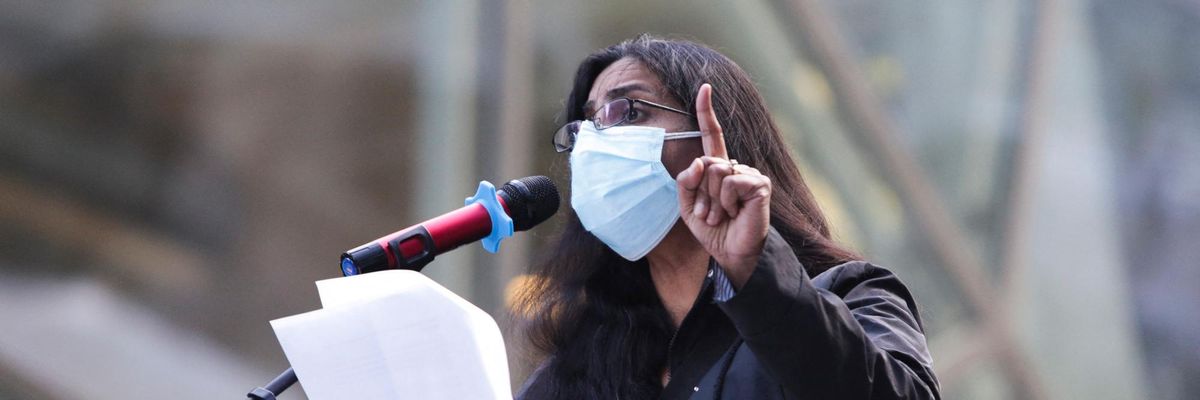The Seattle City Council late Monday passed a resolution calling on President Joe Biden to immediately end U.S. stonewalling of an international effort to suspend vaccine patents as Covid-19 cases surge worldwide, intensifying anger at rich nations as they hoard doses and undercut global inoculation campaigns.
"Profit-driven billionaires and big pharmaceutical companies, with the blessing of the Biden administration, are blocking many countries like Brazil, India, and South Africa from producing generic versions of the Covid-19 vaccine."
--Kshama Sawant, Seattle City Councilmember
Led by socialist Councilmember Kshama Sawant and passed by a 7-to-1 vote, the resolution (pdf) adds the Seattle City Council to a diverse list (pdf) of hundreds of civil society organizations, unions, and advocacy groups pushing Biden to support the patent waiver, which India and South Africa first introduced at the World Trade Organization (WTO) in October.
"I congratulate our movement on winning today's City Council resolution, urging the Biden administration to put human lives before billionaire profit, and remove the WTO patent restrictions to allow all billions of people to have access to the life-saving vaccine," Sawant said in a statement Monday. "This resolution demonstrates our movement's rejection of the status quo of profit-driven vaccine apartheid and vaccine nationalism, and our fight for vaccine internationalism, for a People's Vaccine!"
The resolution's passage comes as activists and U.S. lawmakers continue to pressure the Biden administration to change its position as the WTO prepares to consider the patent waiver proposal once again at a formal meeting next month. The pharmaceutical industry, meanwhile, is aggressively lobbying the Biden White House to maintain its opposition to the measure.
If approved, the temporary waiver would enable generic manufacturers to replicate vaccine formulas, a step proponents say is necessary to bring production into line with global needs.
"The rapid and widespread global dissemination of vaccinations is at the center of every strategy by public health professionals to stop the spread of the virus. Yet, the global situation is dire, with stunningly inequitable vaccination access," Sawant noted Monday. "On average, 1 in 4 people in high-income countries have received a coronavirus vaccine, compared with just 1 in more than 500 in low-income countries."
"Profit-driven billionaires and big pharmaceutical companies, with the blessing of the Biden administration, are blocking many countries like Brazil, India, and South Africa from producing generic versions of the Covid-19 vaccine," Sawant continued. "If we don't fight to change this, starting with the necessary first step of removing the WTO patent restrictions, public health experts say it will literally be years before people in the Global South get the vaccine."
On Monday, the Biden administration committed to sharing up to 60 million doses of the AstraZeneca coronavirus vaccine with other countries once the shot passes federal safety reviews. The White House's announcement came amid reports that the U.S. could have as many as 300 million extra vaccine doses by the end of July as some developing nations struggle to obtain and administer a single dose.
"The U.S. government urgently should launch a program to make eight billion additional Covid vaccine doses within a year's time, share vaccine recipes with the world, and end the pandemic."
--Peter Maybarduk, Public Citizen
While calling the Biden administration's pledge "a welcome and positive step," Peter Maybarduk of Public Citizen said in a statement that 60 million doses "amount to several drops in the bucket compared to global need."
"Low- and middle-income countries will need eight billion doses to achieve 80% herd immunity through vaccination. If the U.S. were to ship all 60 million doses to India today, it would be enough to vaccinate just 2% of India's population," Maybarduk said. "The U.S. government urgently should launch a program to make eight billion additional Covid vaccine doses within a year's time, share vaccine recipes with the world, and end the pandemic."
Nobel Prize-winning economist Joseph Stiglitz and Public Citizen's Lori Wallach issued a similar call in the pages of the Washington Post on Monday, writing that "any delay in ensuring the greatest availability of vaccines and therapeutics is morally wrong and foolish--both in terms of public health and the economy."
"Waiving intellectual property rights so developing countries could produce more vaccines would make a big difference in reaching global herd immunity," Stiglitz and Wallach argued. "Otherwise, the pandemic will rage largely unmitigated among a significant share of the world's population, resulting in increased deaths and a greater risk that a vaccine-resistant variant puts the world back on lockdown."

